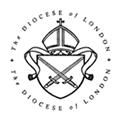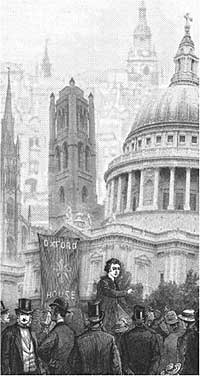Historical themes in the Diocese of London: Church, Community and Society
There are a whole range of interesting topics to explore regarding the relationship between parish churches and the local communities which they served. Questions which might provoke particular interest include: How did the churches respond pastorally to immigration and newcomers to the parishes? What were relations like between Anglicans and those of other Christian denominations and other faiths? How successfully did churches reach out to the working classes? How did parishes respond to social issues? Has religion really been in decline since the end of the nineteenth century? In order to explore any of these questions we recommend the following general process:
Look – Listen - Read - Research
Look
You can learn a great deal about parishes and local communities merely by looking around them with an inquisitive frame of mind. What can you learn about the particular character of the area, its people, its industry and its identity? Can you see evidence of when and how the area has changed?
Listen
Talk to older members of the church and the wider community. What do they remember about the past? Can they shed light on how the area may have altered? Remember that while such memories are valuable, every individual has a particular set of opinions and prejudices - so exercise some caution! However, as you talk to a variety of people you may identify some widespread perceptions. Furthermore you may tap into the communal memory – perceptions, identities and recollections passed down through generations that will be useful to developing your understanding of the area (though be wary of nostalgia). It might be that you can find a long-established clergyman in the area to interview – they can be invaluable! See here for more information on oral history.
As the pamphlet describing the situation in Bethnal Green in the 1830s indicates, many Anglicans were concerned by the spiritual, moral and physical condition of London’s urban population.
Read
You can find a range of books and guides as background for your investigations. A good place to begin is the local archive, which will contain local histories about the community. If you want to find out about past research on a particular area, a useful starting point is the Bibliography of British and Irish History. The individual pages of the resource guide below each provide specific advice on which books might be helpful as you start you investigations.
An helpful overview of the history of a local community or area will be found in the Victoria County History for Middlesex at www.british-history.ac.uk (click on ‘London' and then on ‘Victoria County History: Middlesex'). The twelve volumes of this work cover individual areas of London, most of which are within the present-day Anglican diocese.
Research
London has a wide variety of resources for helping you to understand the past relationship between your church and the local community. The individual pages listed below each contain guides on resources particularly relevant to your topic. In general, you will find that primary sources can be found in three locations:
- Local archives – these contain a wealth of resources specific to the area you are interested in, such as newspapers, local histories and material relating to local groups and individuals. See here for details on local archives.
- National and provincial libraries/archives – London has a considerable number of these larger institutions, such as Lambeth Palace Library, London Metropolitan Archives, Church of England Record Centre and Guildhall Library.
- The Internet – the range of resources available on the web is rapidly growing. Use of search engines such as Google may well uncover online resources. These pages will provide links to a number of useful sites.
Please click on one of the questions below for advice on how to begin research in one of these areas:
How did the churches respond to immigrants and newcomers to local areas?
How successfully did the churches reach out to the working classes?
Has religion really been in decline since the end of the nineteenth century?
How did parishes respond to social issues?







